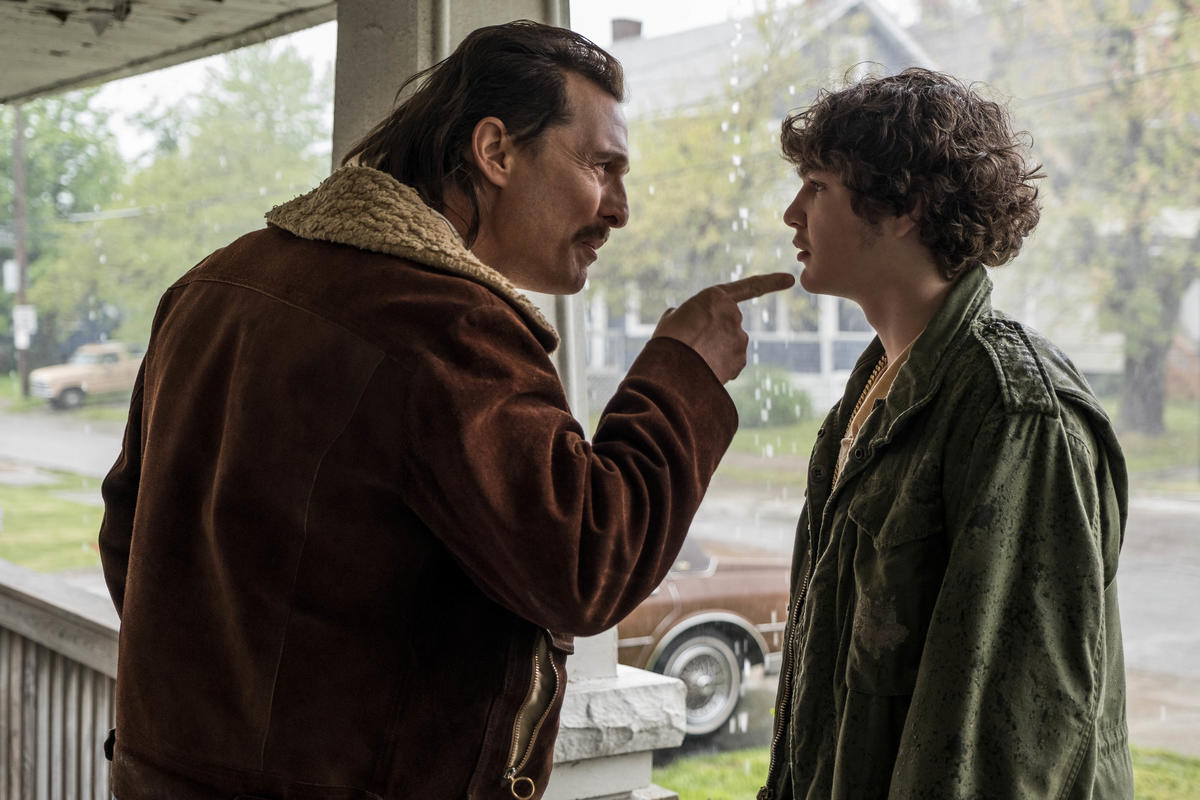White Boy Rick is the true story of Rick Wershe Jr., a kid of only fifteen living in Detroit with his father and sister, who becomes a drug kingpin and FBI informant when life leaves him and his family no other choice. It’s a riveting crime drama with excellent direction, and it’s a story told through its real-life characters rather than being wholly driven by plot. It’s a wise choice; White Boy Rick boasts tremendous performances from its core cast, and the powerful emotions on display drive the entire narrative.
Rick Wershe Sr. (Matthew McConaughey) is a poor, single father trying to make ends meet to support himself and his two children, Rick Jr. (Richie Merritt) and Dawn (Bel Powley). He sells guns illegally, which eventually catches the eye of the FBI, who then coerce Rick Jr. into becoming an informant to take down drug and arms dealers. What White Boy Rick does best is show the audience that these people have no other options; it’s not that they want to be living a life of crime, it’s that they have to. The struggles of America’s lower class are on full display. The bills have to be paid one way or another, and both Rick Sr. and Jr. have to do what they feel is necessary to survive.
Through all of the parodies, car commercials, and imitations, it’s easy to forget that McConaughey is an extremely gifted actor. He’s at the top of his game here as a father just trying to do right by his two kids. It’s a heartbreaking performance, riddled with moments of tough love, rage, helplessness and regret. He cares but never knows how to show it, and he wants a better life for his children than what they currently have but has no idea how to go about it. McConaughey fires on all fronts, holding the film’s emotional center together through most of its runtime.
Richie Merritt as the title character is spectacular, and it’s shocking to discover that this is his film debut. Merritt plays Rick with reservation and naivety: Rick goes about his illegal business with confidence, but whenever a situation arises where he no longer seems sure of what’s going to happen or he’s no longer in control, he becomes quiet and solemn. Rick is painfully aware of how hard life is for his family, and he seeks out small moments of happiness wherever he can, such as getting a giant stuffed bird for his sister, exploring abandoned urban areas with his friends, or catching a movie at the drive-in with a lady friend.
Eventually though, real life catches up with him. He understands the shitty hand that he’s been dealt and the circumstances surrounding that, but like his father, he has extremely limited options as to what he can do about it. Throughout all the crime and undercover work, the film makes sure to give the audience jarring reminders that Rick is still just a child (Rick doesn’t know what a metaphor is, nor does he realize that the jewelry he wears is a Jewish star), making this true story all the more depressing.
Director Yann Demange (’71) keeps the energy up constantly, an impressive feat for a nearly two hour film. The story is immediately and easily engaging, and credit should go to the choice to focus on the Wershe family and their unique dynamic. The emotional family drama is far more riveting than any of the crimes being committed, and Demange seems to know this, giving much more attention to emotional character moments than anything else. You feel for this family and their hopeless situation, and you mourn their failures and losses right alongside them.
If there’s anything flawed with White Boy Rick, it’s the fact that the script could be seen as missing a few opportunities. The themes at work in the film, such as the plight of America’s poor, being forced into a life of crime to make ends meet, and the failure of this country’s judicial system shown through unjust mass incarceration, are shown through the eyes of a white family, whereas black families are more prone to fall victim to these situations and receive harsher punishment. The film doesn’t ignore it completely, there’s a short talk about how Rick would only serve “white time” if caught, as opposed to the rest of his gang who would be serving “black time”, but the chance for a larger and important discussion about these topics skates by.
The film starts out with a possible light at the end of the tunnel and a way out for the Wershe family. Rick begins enjoying life more as he becomes more successful, but who he feels safe with and who he can trust becomes smaller and smaller. The party has to end sometime, and the second half of the film turns dour and more desperate. The final act is heartbreaking and somber, leaving the audience to ponder over how this is but one hopeless story of a poor American family among millions. White Boy Rick is a solid and moving character-driven drama, carried on the back of its strong cast. In today’s times, where income inequality has only worsened, wages have become stagnant, and countless households have little to no money, this film tells a vital story.
Some of the coverage you find on Cultured Vultures contains affiliate links, which provide us with small commissions based on purchases made from visiting our site. We cover gaming news, movie reviews, wrestling and much more.



